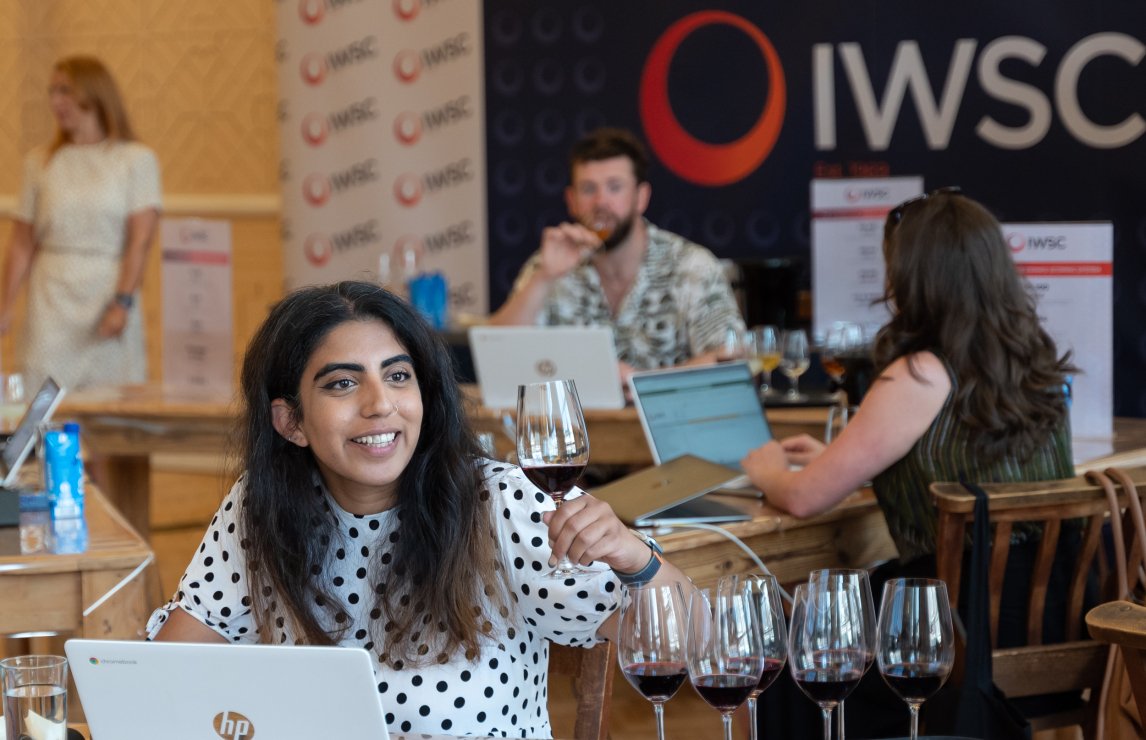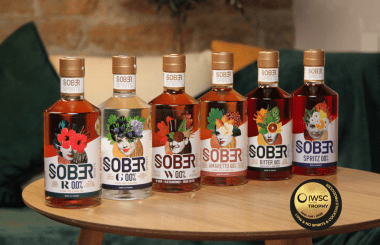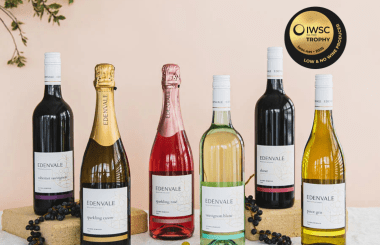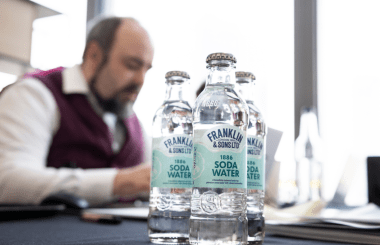IWSC 2023 Alternative Drinks results are out
Following our extensive judging of several important drinks categories on 21 – 22 June, today we are delighted to reveal our 2023 Alternative Drinks medal results. Over 60 international judges gathered at the tasting tables, with a strong representation of industry-leading sommeliers, buyers, bartenders and communicators. The judging panels were overseen by the members of IWSC Judging Committee: Shannon Tebay was in charge of RTD, vermouth, and wine-based flavoured drinks panels; while Claire Warner was overseeing low/no, lighter alcohol and mixers panels.
IWSC 2023 alternative drinks highlights:
- More than 900 entries from over 30 countries have been rigorously judged by 62 international experts – buyers, sommeliers, mixologists, bartenders and communicators.
- A total of 665 medals have been awarded across a range of categories.
- As a result of a higher number of low/no alcohol entries and to ensure a fair judging process, this year, we have decided to introduce 2 separate categories - low/no wine and low/no spirits.
- The low/no wines showed outstanding results earning a total of 172 medals – and thus leading in the overall medal count out of all alternative drinks categories.
- The RTD category won the gold medal race, winning 18 golds in total.
- The IWSC judges were pleased to see the innovative use of ingredients and flavours across all categories.
Low/no wine
This relatively young category has been showing significant growth in both the number of entries and their quality. After some vigorous debate, the judges awarded 10 golds, over 70 silver and over 90 bronze medals to low/no wines. Three gold medals have been awarded to non-alcoholic sparkling – which shows that this particular style continues to be on the rise and there is growing consumer demand for it.
However, it was the no alcohol still wines that received the highest scores from our judges: Giesen's 0% Pinot Gris NV and 0% Merlot NV from New Zealand and Australian Vintage Tempus Two Lighten Up Pinot Noir 2022: all scored 96 points and earned gold medals.
“The low/no wines performed really well. As usual, many of these products rely on sugar as a carrier, but overall the bar is being raised. Sparkling wines truly sparkled and there were quite a few medals in the white category. Altogether, it was an interesting day filled with a diversity of drinks,” said our judges.
Low/no spirits
The IWSC judges were impressed by the quality of drinks represented in this category. “We've seen a real increase in how close those alternatives are getting to the traditional spirits. So a real narrowing of that gap. It was great to see some very interesting uses of ingredients,” said Claire Warner, IWSC judge and member of the Judging Committee overseeing the panel.
One of this year’s trends was an increased number of agave spirits entered into the awards, specifically tequila and mezcal alternatives. “The consumers globally are really inspired by agave. So of course, naturally no and low should respond to this trend and offer some alternatives, and we saw some really great examples in those categories,” Claire Warner said following the judging.
The judges also appreciated the diversity of low/no gins, rums and bitters. A total of 8 golds, over 15 silvers and over 40 bronze medals have been awarded to low/no alcohol spirits, with the highest-scoring entry gaining 97 points, Dzjing, Bergamot, Belgium. Our judges were impressed by the flavour profile, the complexity and spiciness of the ginger making you forget there is no alcohol in the drink. "It is beautifully moderated by dilution, making it a strong contender for cocktails and longer drinks."
Two other high-scoring golds, with 96 points were, New Orleans Bitters by All The Bitter, USA, the judges praised as being "Dry with profound intensity of the classic bitter notes, superb balance and an endless finish", and UK-made Everleaf Drinks, Forest, which impressed our judges with its “harmonious balance of bitter-sweetness”.
Another category which showed significant growth this year was CBD/Wellness drinks, impressing the judges with their robust character and complexity, as well as a few creative flavour combinations, such as yuzu and juniper, pomegranate and ginger, or grapefruit and mint. CBD/Wellness drinks received 3 golds, 4 silvers and 4 bronze medals, with the judges being particularly impressed by Sapinka Organic Fruit Elixir by Good Rootz BV, Netherlands which displayed a “unique combination of flavours of spice, ginger and tropical fruit”.
Liqueurs
A relatively small, but highly promising category, this year, the low/no alcohol liqueurs showed outstanding results, with 4 golds, 7 silvers and 3 bronze medals awarded. The judges were delighted to see a variety of liqueur styles, from an outstanding limoncello alternative - Limonzero, Pallini, Italy, to a masterfully executed low-alcohol umeshu - Joto Umeshu Liqueur, Hombo Shuzo, Japan – both gold winners.
“Some of the lower ABV liqueurs were exceptional, recreating those amazing flavours at a lower ABV, so many of them would work well as a sipper but also in cocktails. Very excited to see where this category continues to go,” the judges said.
Mixers
This year, the mixers category really shone, earning 13 gold medals, 14 silvers and 9 bronzes. The judges praised the innovative use of ingredients which goes hand in hand with the ever-evolving spirits industry. Several mixers scored above 95 points, which attests to the very high quality of this year’s entries. The judges were blown away by the freshness and the clean palate of Goldberg Bitter Lemon by MBG International Premium Brands GmbH, Germany, which scored a stellar 97 points.
Among other top performers which all scored 96 points were - Elderflower & Cucumber Tonic Water and Rhubarb & Hibiscus Tonic Water – both by Franklin & Sons, UK; Swedish Tonic coming in with a hat trick for their Rosemary, Raspberry and Grapefruit, and Stratford Sodas' Spiced Rum Mixer.
Non-alcoholic beers
As one of the leading categories in the low and no space, it is very exciting to watch the non-alcoholic beers evolve and respond to the market trends, our judges mentioned. A total of 3 golds, 2 silvers and 4 bronze medals have been awarded with the judges emphasising the growing diversity of the category: “We tasted some great lagers, but also Pale Ales, and flavoured beers, as well as blonde beers. It is great to see so much diversity, which shows that the consumer is becoming more and more discerning, and the producers are meeting that demand,” said member of the Judging Committee Claire Warner.
One of the highlights of the beer flight was the gold-winning Jack Pine Non-Alc Pale Ale by Harmon's Craft Brewing, Canada, with the judges awarding 96 points and praising its “amazing citrus nose and its deep flavour and freshness".
RTDs
Another exciting category, the “RTDs are certainly here to stay, and this judging has proved it with an extremely high quality across the board,” said Shannon Tebay, who was overseeing the RTD panels. The category saw an impressive number of 18 gold medals; additionally, over 60 silvers and 90 bronze medals have been awarded to ready-to-drink entries.
RTDs based on classical cocktails recipes performed especially well: old fashioned, negroni, bloody Mary, Manhattan, dirty martini, rum punch and a few other ‘traditional’ recipes winning strong golds. One of the stars of the RTD tasting was Original Cocktails By Heublein Wheatley Dirty Martini, Sazerac Company, USA which earned a gold medal and a stellar score of 97 points, the judges describing it as “oily and salty up front on the nose, nice and dirty, with flavours of savoury green olives”.
Also high up the medal table, gaining 96 points was G&J Distillers', Tesco London Dry Gin & Diet Tonic, the judges praised "The level of gin and tonic is well balanced, as is the intensity of sweetness." And Absolut Raspberry Lemonade by Pernod Ricard RTD BU, France impressed the judges, gaining 95 points, with its "expressive nose and a well-rounded palate".
Vermouth & aperitivo
Our judges praised the high quality and the consistency of all Aperitivo and Vermouth entries this year, emphasising how difficult it was to select stand-out drinks and to award gold medals in a category that strong. As a result, 4 golds were awarded, with a total of 15 medals for vermouth and aperitivo entries. One of the standouts was Tesco's Vermouth Bianco NV, the judges commented on its "Elegance from the nose to the finish."
As for aperitivos, the top performing were Aperitivo by Amarico, Italy, and Botivo Slow Sipping Botanicals, UK, both scored 97 points and earning a high gold, our judges describing Amarico as “An explosion of flavours and depth” and Botivo as having a "Sharp nose with spiced hints, a lovely punch with a joyful finish". As well as Wilderton LLC's Bittersweet Aperitivo, USA which gained 96 points, judges commented on the "Citrus peel on the nose with rich bitter notes that blend seamlessly on the palate with layers of herbs."
Wine-based flavoured drinks
With nearly 40 entries this year, wine-based flavoured drinks have firmly established themselves as a strong emerging category offering unique flavours to the consumers. From traditional Chinese plum wines, to rather innovative entries like chocolate wine and honey wine, it was an exciting category to judge, said our experts.
After prolonged discussions, a total of 39 medals have been awarded, out of which 16 are silver and 23 are bronze medals. Plum wines performed very well, however the top-performing entry was something less conventional - Bianco Nobile Vanilla, Les Grands Chais de France – a vanilla wine which earned a strong silver for its pleasant flavours combined with a “rich yet delicate palate”.
Full medal results of IWSC Alternative Drinks judging are available here. Our Judging Committee are now re-tasting each gold-winning entry to select the best bottles and producers across a range of categories. The producer trophy shortlists for alternative drinks will be announced on Tuesday, 4th July. The bottle trophy winners will be revealed on Thursday, 6th July.



